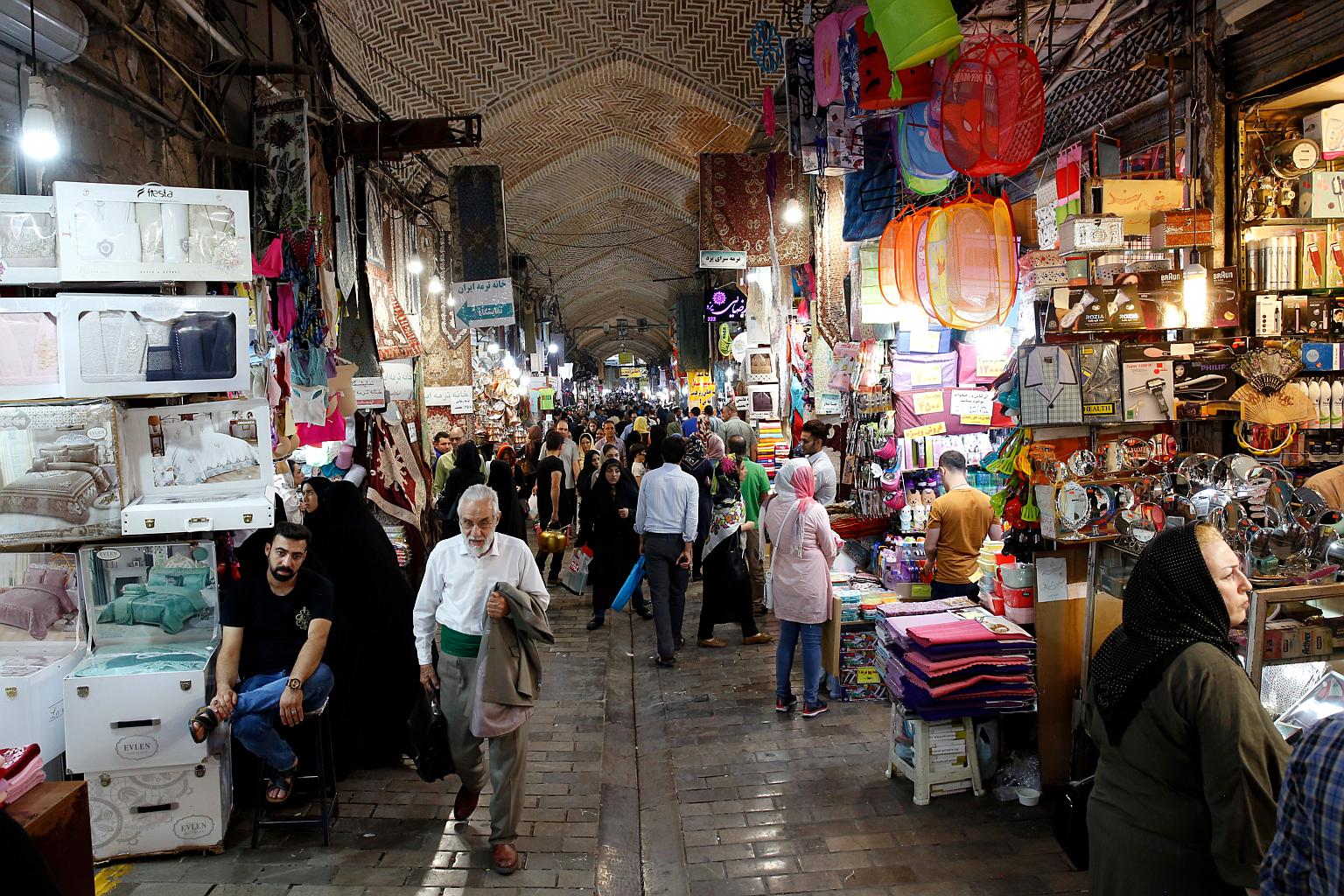Iranians and their leaders brace for impact of new US sanctions
Sign up now: Get ST's newsletters delivered to your inbox

Iranians at Teheran's old Bazaar, on Aug 6, 2018.
PHOTO: EPA-EFE
Follow topic:
TEHERAN, IRAN (NYTIMES) - With an eye to the impending re-imposition of US sanctions against Iran, Saeed Mohammadi, a 38-year-old plumber in Teheran, knew what he had to do.
Last week, like many others, he bought US$1,000 (S$1,368) worth of gold, which has been rising steadily on the local market.
"I'll make a profit that will help me get by a bit," Mohammadi said.
The Iranian government has been preparing for much longer, hoarding foreign currency and cutting off unnecessary imports in the months before the sanctions.
Some parts of its plan were to come together only in the final hours before the deadline.
The so-called snapback sanctions, due to come into force early on Tuesday (Aug 7), bar any transactions with Iran involving dollars, gold, precious metals, aluminium, steel, commercial passenger aircraft and coal.
They also end imports into the United States of Iranian carpets and pistachio nuts, both of which are important symbols for Iranians. Another round of sanctions is due to be introduced on Nov 4.
On Sunday night, five 70-seat turboprop passenger planes built by an Italian and French consortium landed at Mehrabad International Airport in Teheran, Iran's capital.
Under the sanctions, Iran will once again be forbidden to buy new passenger jets for its fleet, despite deals that Iran Air has signed with Boeing and Airbus, and the need for safer aircraft: About 2,000 people have died in plane crashes in Iran in the past two decades.
Yet the country's president, Hassan Rouhani, said on Monday night that Iran could withstand US pressure if Iranians joined together.
Describing as "psychological warfare" an offer President Donald Trump made last month for talks "without preconditions," Rouhani said Iran would need to see "sincerity" from the United States in order to engage in any talks.
"They are the ones who left the outcome of talks and the table of negotiations," Rouhani said, referring to Trump's decision in May to withdraw the United States from the 2015 nuclear deal between Iran and six major powers.
"Someone who offers to hold talks should initially prove that they aim at resolving issues through talks," the Iranian president added.
"What sense do negotiations make when they impose sanctions?" He nonetheless left open an option for talks, saying that "Iran has always welcomed negotiations, if there is sincerity".
The other countries that signed the 2015 nuclear agreement - Britain, China, France, Germany and Russia - do not support the US sanctions, which Secretary of State Mike Pompeo said in May would be the "strongest in history".
The Iranian government tried to calm the markets on Monday before the sanctions were scheduled to begin, although it was unclear how effective those measures would be.
Iran's currency, the rial, rose modestly for the day, but it has lost more than 80 per cent of its value in the past 12 months.
And while much of the devaluation stems from mismanagement and corruption, the United States' withdrawal from the nuclear agreement has exacerbated the rial's weakening.
Iran's new central banker, Abdolnaser Hemmati, on Sunday evening spoke of "economic warfare" by the United States, but also said in an interview on state television that Iran was "powerful".
In an attempt to ease the economic hardship in the country, he announced that starting on Monday, Iranians would no longer be restricted in the amount of dollars and gold they could bring in. An earlier rule capped that amount at 10,000 euros (S$15,817).
Hemmati also announced that the government would subsidise medicine and food to ensure that essential goods could be bought.
Rouhani said on Monday that 1,500 items would be banned from import to save foreign currency for more pressing items. And the central banker lifted a ban on currency trading that some economists say has worsened the crisis.
"As the US sanctions us, we are opening up our markets," said Hemmati, whose predecessor was placed on a US sanctions list in May.
The central banker then cut short the television interview, saying that people should have fun instead of listening to boring things. "We have no worries," he said.
"Why should the people be worried?"
Ordinary Iranians were not so carefree.
In south-western Teheran on Monday, Amir Sherafari was closing down his modest fruit-and-vegetable shop. Together with his brother, who has a master's degree in political science, Sherafari, 38, has used up his father's savings to rent the store.
In recent weeks there have been no customers.
"People think twice about even buying an ice cream," Sherafari said, adding that he did not think Rouhani could change the situation.
"He is stuck between hard-liners and the Americans," the shopkeeper said of the president.
"I'm thinking of becoming a taxi driver or migrating to Europe. That's the only solution."

